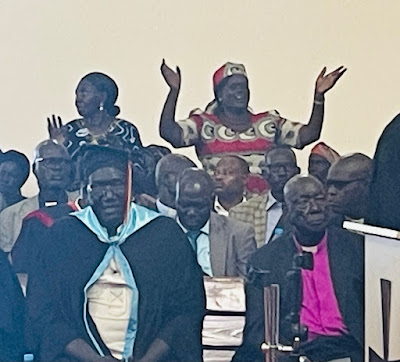For those who do not receive our newsletter in the mail or by e-mail, we wanted our March 2025 newsletter share it here. It includes some of our activities in South Sudan and update about our transition:
This is our last update from Juba. We transition from South Sudan in March. We are filled with many emotions as we prepare to leave our home of almost eight years. Mostly, we are filled with gratitude for the people we have connected with and the gift of doing God’s work together.
Last week we hosted a gathering of facilitators of the Healing Hearts, Transforming Nations (HHTN) workshop in our home. We shared about recent workshops in different parts of the country and testimonies of people who experienced God’s healing and presence. As I looked around, I was grateful for this network that has formed over the years as we have trained more than 50 facilitators in South Sudan. Just in the last few months, our teams have gone to several remote places where there are ongoing tensions and conflict in the community or deep wounds from war and helped people to reconnect with God and with each other.
Our reconciliation team from the South Sudan Presbyterian Evangelical Church (SSPEC) went to the town of Renk in February, on the border between Sudan and South Sudan and continues to receive thousands of people each week fleeing the war in Sudan. On the final day there was a deep communal time of confession, acknowledging the ways different groups have harmed each other. Many people came to confess wrongs done by their communities – a person from the Chollo tribe started by confessing wrongs done by his people to the Dinka. Many others followed, including a Sudanese man who acknowledged with grief some of the specific ways that South Sudanese were discriminated against and attacked by Sudanese in the north. The South Sudanese present were moved to forgive and embrace him.
Abdon, one of our facilitators, will take on the role of coordinating healing and reconciliation workshops with SSPEC after we leave. He experienced deep healing and change in himself when he went through the HHTN workshop a few years ago, and has a passion now to help others experience healing. Please pray that God enables Abdon and provides the resources for future workshops and also for radio programs that have been started to communicate these messages.
In our last newsletter, Bob shared some reflections on his years teaching at Nile Theological College. In December, NTC held a graduation ceremony for all the students who have graduated since 2018. Because of Covid, funding, and security constraints, they have not been able to hold a graduation for the last five years. It was a great joy for Bob to be able to celebrate this accomplishment for the students. Several of Bob’s former students are now exploring options for Masters degrees, so Bob has been helping a few in the application process. We pray that God continues to provide effective training for leaders here in South Sudan.
Last semester we taught a class based on the HHTN lessons at the Juba Evangelical Bible School, a school started by SSPEC to train people for ministry who do not qualify for Nile Theological College. It was a meaningful class, and several students shared that God healed them from pain or bitterness that they had in their hearts. SSPEC has land for the Bible school and is raising funds to build the first building. Board chair Rev. Tut Kuny said that once they have a building where the students can sleep, then they will be able to host students from rural areas. A few churches in the U.S. have contributed towards this building. If you would like to contribute, you can do so through the SSPEC ECO with PC(USA) (E052148) or contact the SSPEC leadership directly.
Living and working with God’s people in South Sudan has been a great gift to us. We have learned so much from our colleagues here and their example of trusting God in the face of suffering and choosing
hope over despair. God is at work here and God’s people are witnessing of God’s love and grace, despite all the ongoing physical crises in this region.
Being in South Sudan has changed us, and we hope that the small ways that we communicate what is happening here have influenced your faith and actions also.
We have also been blessed and inspired by you – your prayers, interest, and contributions towards God’s work in South Sudan are what has enabled this ministry to flourish. Visiting churches and getting to know you along this journey has been a gift. Right now we do not know what our next steps will be. We are praying that God directs us to the right ministry for the next season. We might land in another corner of Africa or we might end up in the U.S. If you would like to reach us or hear our next update, you can reach us at bob.kristi.rice@gmail.com. Please continue to pray for people in South Sudan and the church and ministries that seek to show God's love and healing in the face of suffering.
PC(USA) is making a significant shift in how we engage with global partners. You can read more about these changes in this Presbyterian News Service article (pcusa.org/news-storytelling/news/interim-unified-agency-pcusa-announces-shiftapproach-global-ministry-engagement). The work of all mission co-workers like us is being concluded and the role of maintaining partnerships with global partners will shift to “global ecumenical liaisons.” If you want to support this ongoing work, you can continue to do so through the same account that our support was sent to, E132192.
May God fill you and guide you as you look to Jesus, the author and perfecter of our faith.
Gratefully,
Bob and Kristi


























